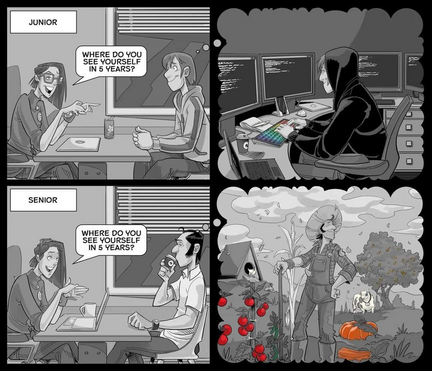
@ianbetteridge @daycoder Code, too. It’s almost like we need a common standard language that tells a computer exactly what to do…if only we had something we could use
https://www.theguardian.com/environment/2023/may/28/ukraine-built-more-onshore-wind-turbines-last-year-than-england Ukraine has built more onshore wind turbines last year than England! Complete joke. Climate inaction alone is reason enough for us to throw this government out
Lately, it really feels like there's enough going on on Gemini to be checking in most days. For those that haven't checked it out in a while, be sure to take a look at @jk 's new geminispace.org project which is pushing the boundaries on what's possible over there
A worked-out example of how the ".zip" domain that Google has opened to registrants can be used in phishing attacks. The URL with the @ sign, and the characters that look like forward-slashes but aren't, looks like it goes to Github to download a zip file, but it actually goes to a server the phisher has registereed with the address "v1.27.1.zip".
The trick can also be pulled with other TLDs, but the .zip domain may make the URL look more like an expected file download.
https://medium.com/@bobbyrsec/the-dangers-of-googles-zip-tld-5e1e675e59a5
I have a new #Gemini project to announce!
Bubble
It is a Gemini-based bulletin board system that combines elements from Station, Reddit, WordPress, and Git-adjacent issue trackers like on GitHub.
Check out the introduction and kick the tires over at: gemini://geminispace.org/u/skyjake/1
#GoogleIO revealed the two weirdest features as a pair.
1. Give a short summary and Google will draft an e-mail for you based on it. You can even click "elaborate" and it will make the e-mail longer.
2. When opening an e-mail, Gmail can summarize the entire thing for you so you don't have to read all of it.
Does everyone realize how fucking bizarre this is?
Both people in the conversation want to work with directness and brevity, and Google is doing textual steganography in the middle.
Interviewer: Can you explain these gaps in your resume?
Me: Those are typographical indicators called spaces and line breaks that separate words and paragraphs.
The amount of money CEOs are willing to invest in an AI that constantly screws up at its job with the promise it will get better is nowhere the amount of money they'd be willing to invest in an employee who constantly screws up while promising they'll get better.
https://www.newscientist.com/article/mg12617212-800-science-the-day-the-sweet-track-was-built/ "The oldest known man-made footpath in Europe the 1800 metre-long Sweet Track across the Somerset Levels in southwest England – was built from oak and other timber felled in the winter of 3807/3806" ... "British archaeologists now have a continuous tree ring chronology for the period 4989 to 381 BC. This can be used to date timber at prehistoric sites throughout England." The fact that we can pin the year that a track was constructed nearly SIX THOUSAND years ago is just incredible!
One of the most frustrating things I find about working in software development is that there is a greater competitive advantage to using the same tools as everyone else even when there are better tools, when one considers their technical merits, for the task at hand. The cost of development velocity as everyone learns something new, the cost of onboarding new hires to something different, the cost of a smaller talent pool willing to learn, the cost of making mergers and acquisitions more difficult all out weigh the benefits of improved reliability, longevity, and general quality of product. For an industry that is commonly referred to as a "technology" industry, there is really very little actual motivation for innovation.
One thing I like about property-based testing is that sometimes writing a test suite that verifies the complete correctness of a system can be quite onerous or may be quite fragile and thus be expensive to maintain but instead I can assert just some key properties that are easy to verify, for example that a returned string matches a regex. It won't guarantee that the system continues to behave correctly, but it gives some confidence at very little cost.
@GeePawHill I’ve lately been thinking about starting a new project as planting a seed. Then I have to take care of it, tend to it, prune bad parts, and overall make it grow. Take some cuttings and plant them in a new area.
Let’s me think of myself as a software gardener: I grow software.
@akshayde @GeePawHill Bullet dodged! Can only imagine the mess they must have
"It was a great disturbance in the UK, as millions of phones suddenly cried out and were suddenly silenced." Someone had a fun day at work https://youtu.be/24RRz7VmrfA
Software engineer by trade. Programmer by hobby too (in addition to basketry and spoon carving). Personal website: https://rlamacraft.uk/. Gemini capsule: gemini://gemini.rlamacraft.uk



